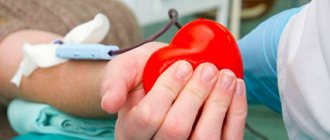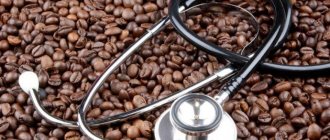Coffee beans are a source of valuable antioxidants and essential oils with antimicrobial activity. By combining them correctly with natural ingredients, you can support your heart, relieve a cough, or even stop a cold completely! The main thing is to observe the “temperature regime” and not overuse it.
By placing a taboo on drinking coffee for colds, doctors justify their ban by increasing the load on an already beating heart.
And in vain: used in the right doses and combinations, a drink that makes the morning invigorating will become an assistant in the fight against pathogenic “provocateurs”. So is it worth denying yourself the usual morning “ceremonial” when you are sick?
Can you drink coffee when you have a cold?
You constantly want to sleep, it’s hard to keep your head in balance, all your bones are aching, your body is weakened - everyone is familiar with this state during a cold. It seems that coffee should help in such a situation, because it invigorates quite well. But doctors often prohibit drinking it.
Medical professionals say that coffee increases blood pressure, invigorates the body, and during illness you need to rest more. Also, this drink dehydrates the body and doctors believe that the patient will not drink enough water, which is necessary for recovery. This is true, but it turns out that if you follow certain rules, you don’t have to exclude this favorite drink from your diet.
- Drink more fluids. Coffee is a diuretic, so it helps remove the disease from the body faster.
- Do not drink more than 2 cups a day, even if you really want to. Otherwise, you can only harm yourself.
- Do not drink a hot drink at a high temperature - it will raise it even more, and this should not be allowed.
- Add special seasonings to the drink that will help you heal faster.
In 2020, scientists recognized that coffee helps fight colds. After all, it contains a large amount of biologically active substances (chlorogenic acid and its derivatives), which are an antiviral agent.
May be dehydrating and cause diarrhea
Coffee can also cause some side effects. The caffeine in coffee has a diuretic effect, meaning it can draw fluid from the body and cause it to be excreted through urine or stool ().
In some people, drinking coffee can lead to dehydration due to diarrhea or excessive urination. However, some researchers note that consuming caffeine at moderate levels—such as 2 to 3 cups of coffee per day—does not have a significant impact on your fluid balance (, , ).
In fact, coffee drinkers are more likely to become accustomed to the diuretic effect of coffee to the point that it no longer causes them problems with fluid balance ().
If you're experiencing vomiting or diarrhea—or if you have the flu, a bad cold, or food poisoning—you may want to skip coffee and opt for more hydrating drinks, especially if you don't drink coffee regularly.
Some examples of more hydrating drinks are water, sports drinks, or diluted fruit juices.
However, if you drink coffee regularly, you can continue to drink coffee without an increased risk of dehydration while you are sick.
Conclusion:
In people who are seriously ill or experiencing vomiting or diarrhea, coffee can worsen these problems and lead to dehydration. However, people who drink coffee on a regular basis may not have these problems.
Coffee at temperature
While you can, and sometimes even need to, drink coffee when you have a cold, it is strictly prohibited when you have a fever. After all, it affects the work of the heart, adding load to it, and it is already quite stressed due to the feverish state.
But, you need to remember that the temperature varies and is tolerated differently. During illness, it changes from 37, which is not at all scary, to 40 degrees, which significantly affects your well-being.
Therefore, if at 37 degrees you can continue the usual rhythm of life with a coffee cup in your hand, then at 38 you need to put it away immediately, go to bed and allow yourself to rest.
May help you feel more energetic
Many people drink coffee in the morning every day to get an extra boost of energy at the start of the day.
In fact, even decaffeinated coffee can have a mild stimulant effect on people due to the placebo effect (). For many coffee drinkers, this noticeable increase in energy is one of the key benefits of coffee, and also one of the reasons you might drink it when you're sick.
For example, this drink can give you energy if you're feeling sluggish or tired, but still well enough to go to work or do household chores.
Additionally, if you are dealing with a mild cold, coffee can help you get through the day without any significant symptoms of illness.
Conclusion:
Coffee can give you an energy boost, which can be useful if you have a mild cold - enough to go to work or do household chores.
Is it possible to drink coffee if you have a sore throat?
If you have a severe sore throat, you will have to give up the drink. After all, it irritates the mucous membrane, causing even more severe pain. Also, it is prohibited to consume other cold and hot drinks. It is better to replace them with unsweetened compote, weak tea, chicken or vegetable broth and plain water. Everything should be at room temperature or 1-2 degrees warmer. And to reduce pain, you can drink through a straw.
Foods to reduce fever
High temperature is a symptom of many diseases. Accompanied by headaches, chills, body aches and loss of strength, it brings a lot of discomfort to a person who is trying in every possible way to reduce it.
However, doctors and scientists insist that this is not always advisable. And they explain in detail why in their numerous publications.
They also include a list of special products that can, if not knock it down, then at least alleviate the patient’s condition.
What you need to know about temperature
Body temperature above 36-37°C is considered high. In the process of increasing, before it reaches its peak and stops, a person feels a feeling of cold, although he himself is burning. And few people know that 36.6°C is not a standard.
Moreover, depending on time or various factors such as exercise, food intake or sleep, it may change, and this is absolutely normal.
As a rule, body temperature is highest at 6 pm and lowest at 3 am.
By raising the temperature, our immune system tries to fight off the infection. The mechanism of its operation is quite simple: such increases lead to an acceleration of metabolism, which in turn helps to destroy pathogenic organisms in the blood.
If a person leads a healthy lifestyle, she succeeds. However, sometimes the temperature can rise too quickly. This is a serious problem that can lead to complications. In this case, it is important to take antipyretics in a timely manner and increase the amount of fluid consumed. This will allow you to quickly establish thermoregulation.
According to Western therapists, if the temperature has increased slightly, it is not worth bringing it down. After all, at this moment the immune system successfully neutralizes bacteria and viruses that provoked the disease.
It is advisable to take antipyretics only if such changes cause discomfort. And also if the thermometer exceeds 38°C. Since then, it has ceased to be insignificant and requires immediate intervention from the outside.
The obtained indicators need to be rechecked every couple of hours.
By the way, the mark of 38°C is correct only for the temperature that is measured in the mouth. If a person is more accustomed to holding a thermometer under his arm, he needs to lower it by 0.2-0.3 ° C and start taking antipyretics earlier.
Under no circumstances should high fever in children be ignored. It can provoke the development of febrile convulsions, or febrile attacks in them. Most often, they appear between the ages of 6 months and 5 years and can recur with subsequent diseases accompanied by high fever.
Food at temperature
For a speedy recovery, doctors recommend following several tips, namely:
- Increase fluid intake during illness. This can be water or juice, the main thing is that you drink a glass every three hours. They will help not only curb the rise in temperature, but also saturate the body with vitamins and increase its defenses (in the case of juice).
- Eat more fresh fruits . They are quickly digested and enrich the body with useful substances. Nevertheless, it is still better to focus on grapes, apples, oranges, peaches, lemons and pineapples. But it is better to refuse any canned ones. They are rich in preservatives, which can only make the situation worse.
- At very high temperatures, it is useful to switch to easily digestible foods . This could be steamed vegetables, vegetable soups, oatmeal, boiled eggs, yogurt, etc. While saturating the body with energy, they are still quickly digested, preserving its strength to fight infection.
Top 14 High Temperature Foods
Green tea or juice. You can replace them with water, compote and even harmful soda, as one famous children's doctor said. Drinking plenty of fluids is the key to success in the fight against high fever.
It is appropriate even when taking antipyretics, especially since the latter are especially effective when combined with a sufficient amount of fluid. This is explained by the fact that it allows you to effectively cleanse the body of toxins and establish thermoregulation processes.
It also prevents the proliferation of viruses and bacteria that prefer dehydrated cells.
Citrus. Oranges and lemons are extremely rich in vitamin C. It is responsible for the functioning of the immune system and helps the body cope with infection faster. In addition, lemon helps restore lost appetite and relieves nausea.
There is an opinion that 1 grapefruit, 2 oranges or half a lemon can lower the temperature by 0.3 - 0.5 ° C. However, they are allowed only if the cause of the fever is not a sore throat. Firstly, they irritate him.
And, secondly, they create favorable conditions for the development of pathogenic organisms.
Basil. It has bactericidal, fungal and disinfectant properties and is considered a natural antibiotic in many countries. Moreover, it not only eliminates fever, but also acts directly on the cause of its occurrence, helping the body heal faster.
Raisin. Oddly enough, it is dried grapes that effectively combat high temperatures. It contains antioxidants and vitamin C, which can enhance the body's defenses.
Oregano (oregano). It is used in Chinese medicine. It reduces fever, relieves nausea and indigestion. It is also used to treat respiratory diseases and throat diseases.
Rice. It contains a lot of water (according to various sources from 40 to 90%), necessary during this period, is quickly digested and prevents diarrhea.
Vegetable soup is an excellent refreshing and easily digestible dish. Doctors recommend adding carrots and a clove of garlic to it. They help speed up metabolism and improve immunity.
Boiled potatoes. It is quickly digested and prevents diarrhea. And the addition of black pepper and cloves to it makes this dish especially effective for colds and coughs if they are accompanied by fever.
Apples. 1 apple a day saturates the body with fluid, as well as many vitamins and minerals, including iron, which is necessary to maintain normal hemoglobin levels and good immunity.
Boiled eggs, preferably quail. They contain a huge amount of useful substances, increase the body's defenses and are easily digestible.
Milk and lactic acid products. This is a source of calcium, which is necessary for restoring strength at fever. If possible, it is better to add live yogurt or biokefir to your diet. In fact, these are probiotics that are responsible for intestinal health. But immunity depends on it.
In July 2009, an interesting publication appeared in the journal Pediatrics stating that recent research had found that “probiotics are highly effective in treating fever and cough. Moreover, they act on children like an antibiotic.” But consistency is important here.
The studies involved children from 3 to 5 years old who consumed live yoghurts for 6 months or more.
Oatmeal. It is very nutritious and healthy. Saturating the body with potassium, sulfur, sodium, magnesium, phosphorus and other substances, it helps strengthen the body and speed up recovery.
Chicken bouillon. This is a source of fluid and protein, which are essential for the body at high temperatures. By the way, a handful of vegetables also gives it antioxidant properties, making it especially beneficial for a weakened immune system.
Ginger. A lot has been written about this root vegetable, and there are explanations for this, since it has anti-inflammatory and strong diaphoretic properties and helps the body cope with infection, effectively lowering the temperature. Most often they drink tea with ginger. But it is useful only at low temperatures (37°C). If it rises to 38°C or more, ginger is contraindicated!
How else can you help the body with fever?
- Remove fatty or spicy foods from your diet. They provoke the appearance of diarrhea.
- Eat small meals 5-6 times a day. Overeating slows down the digestion process and can cause nausea.
- Avoid fried and unhealthy foods, as well as meat. The body needs to spend a lot of energy to digest them, which it could use to fight the infection.
- It is undesirable to smoke and drink alcohol, as they can only aggravate the situation.
- Regularly ventilate and moisten the room.
- Give up coffee. It reduces the body's defenses.
- Try to cool your body in every possible way by removing an extra jacket or lowering the room temperature by a few degrees.
- Reduce your consumption of sweets to a minimum. Sugar slows down the process of suppressing the virus.
- Minimize the consumption of raw foods, as they are less digestible.
- Replace tight clothes with loose and comfortable ones. During this period, the body needs to relax as much as possible, improve blood circulation and ensure sufficient oxygen supply to the lungs.
Source: https://edaplus.info/food-for/reduce-fever.html
Coffee recipes for colds
Various supplements can help fight the disease. You can make yourself a cup of coffee drink with toppings that will not only improve your condition, but also add strength. In addition, coffee vapor can be beneficial, as can aromatherapy.
Cinnamon
What beneficial properties does it have during illness?
- Has antiviral and antibacterial properties.
- Acts as an expectorant.
- Tones the body, accelerating the blood.
- Removes toxins from the body.
- Restores the immune system.
When cooking in a Turk : for 3 tsp. 0.5 tsp of ground coffee is added. cinnamon and place on low heat, stirring occasionally in a circular motion. Fry the mixture until you smell the bitter aroma of cinnamon. Then, the mixture is poured with 300 ml of water and brought to a boil. After 10 minutes you can drink.
To prepare in a coffee machine : pour the same proportions into a special compartment, add water and wait until it is ready. In this case, the drink can be consumed immediately.
For instant drink lovers: sprinkle cinnamon on the tip of a knife into the brewed coffee and stir well. Ready. But in this version, the cinnamon will not completely dissolve and will end up on the tongue while drinking.
You can also add ginger, milk, cream and other ingredients. This will only make the drink tastier.
Do you drink coffee when you have a cold?
Yes
No
With honey and lemon
Useful properties of the drink for colds:
- Relieves headaches.
- Has antiviral properties.
- Tones and strengthens the body.
- Charges with energy.
- Raises low blood pressure.
Brew or steep coffee in the usual way. Add a piece of lemon and honey to taste to the ready-made drink. Let sit for five minutes. The drink is ready to drink.
With cardamom
Why you should drink coffee with cardamom when you have a cold:
- Removes mucus from the body.
- Stimulates brain function, relieves nervous tension and improves mood.
- Normalizes digestion (and when taking pills this is very important).
- Has an analgesic effect.
- Kills germs in the mouth and throughout the body.
- Lowers blood pressure.
It is advisable to prepare coffee in a Turkish coffee pot. To do this, pour the usual amount of coffee into the bowl and add 3-5 cardamom seeds. Pour the mixture with water and put on fire. When foam appears, remove from heat, when the foam has completely settled, put back on the fire. Repeat this action 3 times. After preparation, let the drink infuse. Then you can pour the drink into a cup that has been preheated with boiling water. Ready.
If you only have ground spice, you can add it to ready-made coffee at the tip of a knife.
With star anise
Useful properties of the drink for colds:
- Has an antiviral effect.
- Strengthens the immune system.
- Has diuretic properties.
- Acts as an expectorant.
This coffee is prepared in the same way as with cardamom. Only instead of crushed seeds, 1 star anise is added. You can add a little sugar and cream to your coffee.
Inappropriate use...
Excessive consumption of coffee, black and green tea really “delays” recovery. These drinks contain caffeine, an alkaloid that stimulates the production of the “stress” hormones adrenaline and cortisol. Excess of them suppresses the immune system.
The second argument against it is that after the body temperature “exceeds” 38C, the heart begins to work harder. A cup of coffee will turn the conditions for his work into extreme ones: the next surge of adrenaline “accelerates” the heart to 120-130 beats/min!
And, of course, the stimulating effect of the alkaloid on the nervous system. Because of this, drinking coffee for a cold that requires quiet time in a warm bed also seems inappropriate.
But look at the recipes for symptomatic cold remedies. Many of them include a combination of paracetomol with vitamin C and caffeine. The first two components eliminate symptoms. Caffeine increases the availability of paracetomol and ascorbic acid for the body and relieves headaches.
So is it possible to drink coffee if illness occurs?
The effect of coffee on pregnancy
Some doctors insist: coffee is dangerous only in the first months of pregnancy, when the placenta is still being created and the fetus “pulls” all the substances from the mother. Then the baby’s body is formed. If coffee “hits” the nervous system, then the baby may be born with abnormalities. But most researchers are confident that the drink is dangerous for both the woman and the unborn child during all months of pregnancy.
Why is coffee harmful to the fetus?
- the number of heart contractions and breathing accelerates;
- there is an addiction to caffeine, which enters through the placenta;
- the nervous and skeletal systems develop poorly;
- The diuretic effect of the drink reduces blood flow in the placenta.
Doctors warn: consuming more than 200 milligrams of caffeine per day doubles the risk of miscarriage or giving birth prematurely. Cause? The tone of the uterus increases.
But even in small doses, coffee is dangerous for pregnant women because:
- there is a risk of pressure surges, especially for those suffering from hypertension;
- stomach acidity increases;
- calcium is washed out, this mineral is vital for the formation of the fetal skeleton;
- vitamins are poorly absorbed;
- the load on the kidneys increases.
In pregnant women, the kidneys always begin to work in “emergency mode”, and with the use of coffee, which has a diuretic effect, this mode can exceed all possible and impossible norms. Swelling immediately occurs, pressure surges appear, even in women who have never suffered from this. Plus – rapid heartbeat and shortness of breath.
The second constant companion of pregnancy is heartburn; many mothers suffer from it day and night. So, coffee only aggravates this misfortune, and can, as a result, lead to serious digestive disorders. An aromatic drink made from tasty grains increases the acidity of the stomach. Therefore, if the expectant mother already has a history of gastritis, then coffee turns into pure poison for her. Especially if the acidity is already high.
The aromatic drink contains two more reasons why it is dangerous for expectant mothers:
- Caffeine constricts blood vessels, and the baby receives little oxygen and necessary substances. If a pregnant woman drinks coffee and strong tea several times a day, irreversible processes may occur for the baby.
- Appetite is suppressed. The drink is filling, but not at all nutritious, but a child needs to “eat well” in order to develop properly.
Conclusion
- You can drink coffee for a cold if the patient’s temperature does not rise above 38 degrees;
- Chlorogenic acid contained in coffee is a natural antiviral agent;
- Be sure to drink plenty of other fluids when you are sick, and caffeine will help flush out toxins along with it;
- Instant coffee is harmful, it is better to drink natural, freshly ground and freshly brewed coffee, and make it weak;
- Add spices, lemon or honey to your coffee - they will help restore strength and recover faster.
For sore throat
If the first sign of the disease is discomfort in the throat: tingling, pain, brew a cup of coffee using this recipe: pour the coffee with very cold water, add sugar as much as you like, and bring to the first stage of boiling (when the foam just begins to rise), constantly stirring the coffee in the Turk.
Let the drink sit for a while (literally 5 minutes), then add a pinch of salt, a pinch of ground red pepper and half a teaspoon of butter to it - and bring it to the first stage of boiling again.
Take no later than 5 hours before bedtime.
Interacts with some medications
Coffee also interacts with some medications, so you should avoid coffee if you are taking one of them.
In particular, caffeine may enhance the effects of stimulant medications such as pseudoephedrine (Sudafed), which is often used to relieve cold and flu symptoms. It may also interact with antibiotics you may be taking if you have any kind of bacterial infection (,).
Again, coffee drinkers may tolerate these medications well while drinking coffee because their bodies are accustomed to its effects ().
However, you should talk to your doctor before drinking coffee with these drugs.
Another option is to drink decaffeinated coffee while taking these medications, since the caffeine in coffee is the cause of these interactions. While decaf coffee contains trace amounts of caffeine, such small amounts are unlikely to cause drug interactions ().
Conclusion:
The caffeine in coffee can interact with stimulant drugs such as pseudoephedrine as well as antibiotics. You should talk to your doctor before drinking coffee while taking these medications.
A few facts about instant coffee
- Instant coffee is of lower quality than grain coffee.
- It has the same positive and negative properties as grain. True, these properties are less pronounced.
- To achieve good taste, manufacturers add chemicals (stabilizers, antioxidants, dyes) to instant coffee. Coffee free from such additives is called organic.
- In the process of growing beans, coffee producers often use pesticides, which end up in the mug with the drink even after extraction when making instant coffee.
Sore throat from cold air. Sore throat without cold symptoms: problems after recovery
Feeling the familiar pain, soreness and burning sensation in the throat when swallowing, a person thinks about a cold. But pain is not necessarily a symptom of this disease - there are many reasons for the manifestation of similar symptoms.
One of the reasons that cannot be attributed to diseases of the body is smoking. Cigarette smoke contains many tars and chemicals harmful to humans. The cause of pain is irritation of the mucous membrane by chemicals.
Note! Sore throat can occur not only in active tobacco users, but also in passive smokers.
Medically explained causes of sore throat:
- Infectious – the body becomes infected with harmful viruses or bacteria. Most often, infection occurs through the respiratory tract, but it is also possible through tactile contact (shaking hands) and during sexual intercourse.
- Non-communicable diseases are diseases that are not transmitted from person to person. Such diseases arise due to a weakening of the general condition of the body, an aggressive environment, congenital or hereditary anomalies of the body (asthma, stroke, oncology).
When there are no symptoms of a cold and your throat hurts, you should urgently consult a specialist to clarify the reasons.
infectious infections
diseases caused by viruses and bacteria. Many of these diseases are transmitted by airborne droplets and are therefore highly contagious.
Infectious diseases that cause sore throat:
Manifestations of measles in the oral cavity
- Colds - this item was included in the list due to the frequent asymptomatic course of the disease. With a weakened immune system, a cold does not cause fever, cough or other typical symptoms, but a sore throat may be present.
- Influenza is a disease that has the effect of absorbing immunity. The body quickly becomes exhausted and loses its ability to fight the virus. As a result, pain in grief appears, but cough and other symptoms may be absent. Although in most cases with the flu, even in people with a weakened defense mechanism, a high temperature is observed.
- Measles is a disease manifested by a high level of intoxication, rashes on the skin, and possible fever. A concomitant symptom is catarrh of the upper respiratory tract, resulting in acute sore throat.
- Mononucleosis - typical symptoms for this disease: loss of appetite, headache, enlarged lymph nodes (both in the neck and in the armpits), fever. As a complication, inflammation of the liver and enlargement of the spleen may begin. Also, a large amount of mucus accumulates in the lungs and a sharp sore throat appears.
- Viral pharyngitis is one of the diseases in which pain in the throat is the main symptom. Pharyngitis is an acute inflammation of the mucous membrane of the throat, aggravated by inhaling dirty or cold air, chemical irritants or tars contained in tobacco smoke.
- Tonsillitis - characterized by headache and general weakness of the body, painful enlargement of the lymph nodes. The main cause of sore throat is severe inflammation of the tonsils of the palate. Moreover, with tonsillitis, the level of pain varies between moderate and very severe.
Escherichia coli in a smear
- Chronic inflammation of the tonsils is the result of an unscrupulous attitude towards the treatment of tonsillitis, but can also manifest itself under other circumstances (weakening of the body, a strong causative agent of the disease, improper treatment of less complex diseases). In chronic form, inflammation of the tonsils, and, as a result, sore throat, appears due to hypothermia, stress, and seasonal peaks of the disease.
- Streptococcal tonsillitis is often an asymptomatic course of the disease, allowing it to be confused with the classic cold. It is expressed in enlarged lymph nodes, exudate (stretching mucus from the throat), sore throat and fever. Basically, streptococcal sore throat is typical for children.
- Intestinal diseases - the causative agent is a bacterium (Escherichia coli), which causes a febrile state, a rise in temperature, and severe dehydration. Symptoms depend on the specific type of intestinal bacteria; with certain bacteria, a sore throat is observed.
Infectious diseases are transmitted rapidly - the nature of their pathogens allows them to travel through the air. It is also possible to transmit the infection through a handshake or the use of objects used by the carrier.
Therefore, during dangerous periods (winter, outbreak of infection), it is recommended to avoid being in a crowd, wash your hands more often with soap (do not touch the exposed mucous membrane of your eyes or mouth before washing).
Non-communicable diseases
Non-communicable diseases are transmitted along the family line and manifest themselves in the modern environment.
A person, without knowing it, sometimes provokes the occurrence of such diseases in his body. For example, an allergy from overeating a certain product.
- Non-communicable diseases that cause sore throat:
- Allergy – a classic reaction to an allergy is swelling of the internal tissues of the throat. A person may not notice other signs (red eyes, itching), but may feel a sore throat due to swollen ligaments and blood vessels.
- Polluted or dry air - when you inhale air that contains chemicals that are harmful to the body. The mucous membrane becomes irritated, resulting in pain in the throat. When the body is saturated with dry air, pain appears due to excessive dryness of the throat. There may also be general discomfort, heaviness of breathing, and soreness.
- Vegetative-vascular dystonia - among the many symptoms of dystonia, there is a feeling of a lump in the throat, which complicates breathing. Basically, the nature of the disease is related to the psychological state of a person. Vegetative-vascular dystonia can cause sore throat, and in some cases, symptoms of suffocation.
Note! Vegetative-vascular dystonia is a disease that can completely depend on a person’s psychological state, so if pain occurs, try to relax, let go of problems, lie down and think about good things, breathe evenly and calmly.
- Gastroesophageal reflux - between the esophagus and the stomach there is an important mechanism - the gastroesophageal sphincter - which allows food to enter the stomach and closes the path back. When this mechanism is dysfunctional, gastric juice enters the esophagus (rarely reaches the throat), which leads to pain, soreness and burning in the throat.
- Airway Injuries – In complex airway injuries, the cause of the problem is obvious. But with minor accidental injuries, the cause of the pain may not be understood. For example, hot food that burns the mucous membrane of the larynx.
- Tumors of the throat and tongue - tumors are caused by various irritations of the tissues and mucous membranes of the mouth. Tumors especially often bother heavy smokers, although the person may not be aware of the primary cause of the ailment.
- Complications of immunodeficiency - HIV infection affects all parts of the body, but a sore throat is not necessary. More likely are complicating diseases affecting the pharynx and upper respiratory tract - for example, candidal stomatitis.
Non-infectious diseases quickly develop into chronic diseases, so when they are initially detected, treatment must be started quickly. Otherwise, the problem of sore throat may return constantly.
Treatment of sore throat
For quick treatment, it is necessary to determine the problem, so it is recommended to consult a specialist.
- Before going to a specialist, you can take a number of actions:
- Quit smoking – at least until you go to the doctor. If going to the doctor is not possible, try not smoking for at least a few days - most causes of pain are associated with tobacco use.
- Take antiseptic medications - absorbable tablets, sprays. Yox and Hexoral sprays, Lizobakt and Faringosept tablets help well; these drugs fight harmful flora. Sprays should be sprayed into the throat and tonsils, tablets should be dissolved.
Note! When using any medications, carefully read the instructions: dosage, methods of use, side effects and the individual intolerance section.
- Gargle and rinse your nose - for rinsing the nose Aquamaris (based on sea water), for rinsing - antiseptic decoctions of chamomile or calendula, medicinal rinses - furatsilin, chlorhexidine, miramistin.
Please note: these recommendations are general and apply to more frequent cases. To treat a specific disease, a specific prescription is needed, therefore, if the above recommendations do not help within 2-3 days, contacting a doctor should be urgent.
Conclusion
A sore throat may well be due to a cold, although no cold symptoms are observed. There are opposite situations - ordinary pain indicates serious illnesses.
When is coffee dangerous when you're sick?
It is unsafe to drink coffee if you have ARVI or fever. Doctors recommend taking the “dark continent” drink only during a mild cold. It is easy to harm a weakened body; it is much more difficult to recover. Giving up the usual amount of coffee will speed up recovery and strengthen the immune system.
A drink at room temperature in the early stages of a cold or during the recovery period will speed up the return to your normal lifestyle. Until recently, it was believed that coffee should be excluded from the diet if you have a cold. In 2020, scientists refuted this judgment. This pleased many lovers of the drink from the “dark continent”.
You need to take your favorite medicine according to the recommendations of specialists and do not increase its daily dose. In order to help yourself recover, you should drink only natural grain coffee; the instant analogue does not contain any beneficial properties.
source
Products for health
Having become infected with the flu, each of us feels symptoms that cause not just discomfort, but excruciating headaches, high fever, cough, aching joints, muscle pain, etc. The reason for this is intoxication of the body from the decay of some cells and viruses. External manifestations are evidence of internal problems - swelling, inflammation, congestion. To eliminate symptoms and destroy bacteria, comprehensive treatment is necessary.
Important: self-medication of the flu is strictly prohibited. To clarify the diagnosis, a visit to a doctor and adequate therapy are necessary.
To eliminate the disease, symptomatic as well as etiotropic treatment is undertaken. The use of antiviral agents, immunomodulators, immunostimulants, antipyretics, painkillers, antihistamines and antispasmodics is indicated. To stimulate expectoration and eliminate the cough reflex, mucolytics and bronchodilators are prescribed depending on the type of cough.
Important: reducing the temperature to 38.5 is not recommended. Temperature indicates the body's fight against viruses.
May irritate stomach ulcers
Coffee is acidic, so it may cause stomach irritation in some people, such as those with active stomach ulcers or acid-related digestive problems.
According to a study of 302 people with stomach ulcers, more than 80% reported an increase in abdominal pain and other symptoms after drinking coffee ().
However, another study of more than 8,000 people found no relationship between coffee consumption and stomach ulcers or other gastrointestinal problems such as intestinal ulcers or acid reflux ().
The connection between coffee and stomach ulcers varies from person to person. If you notice that coffee causes or worsens stomach ulcers, you should avoid drinking it or switch to cold brew coffee, which is less acidic ().
Conclusion:
Coffee may further irritate stomach ulcers, but research findings are not conclusive. If coffee irritates your stomach, you should avoid drinking it or switch to cold brew, which is not as sour.











